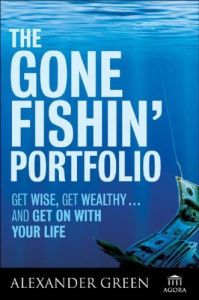Join getAbstract to access the summary!

Join getAbstract to access the summary!
Alexander Green
The Gone Fishin' Portfolio
Get Wise, Get Wealthy...and Get on with Your Life
Wiley, 2008
What's inside?
Survive Wall Street, achieve your investment goals and secure your financial independence.
Recommendation
getAbstract recommends this excellent, straightforward, hype-free and solidly grounded guide to investing. Research analyst and investment adviser Alexander Green draws on portfolio management methods used by the world’s biggest institutional investors. He goes straight to the basics, emphasizing financial discipline, saving and awareness of costs. The portfolio he recommends consists entirely of low-cost Vanguard mutual funds, mostly index funds. He recommends keeping 70% of your portfolio in stocks. That recommendation may seem risky, especially in view of volatile stock market performance. However, he cites historical and financial research to demonstrate that, over time, equities have been the highest returning class of investments, even during such catastrophes as the Great Depression. This kind of straight talk is an excellent prophylactic against both the panic of crashes and the euphoria of bubbles.
Summary
About the Author
Alexander Green is the Investment Director of the Oxford Club and Chairman of Investment U, an Internet-based investment research service.
















Comment on this summary